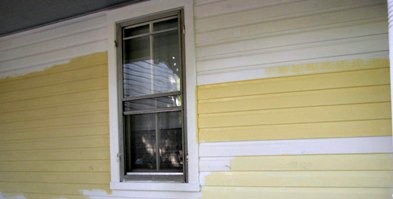Exterior Restoration and Preservation :: Siding, Paint and Windows
*******
:: aka if there is such a thing as a personal hell – mine would be filled with painted hinges: Part 1
I know it is nothing new – that is, blogging about the work I am doing on my own house. But frankly, College Word :: I would be remiss if I didn’t write about at least some of the projects that I have going on. Today, a little about, Exterior Restoration and Preservation – the Siding and the Windows.
And before I dive into my next few posts (regarding paint and other work on the front of the house), I wanted to summarize some of what I have told you thus far:
* Our current home is a 1880’s carpenter-style … ish Victorian-era farmhouse that originally held ten city acres.
* It ironically has a lot of wood: from oak to cypress, from cherry to fir, and so on.
* This house was abandoned for 2 years prior to us owning it.
(One day, I’ll break out pics of the yard & the massive, yes, massive termite damage.)
That said — some decisions made early on have guided much of the work I am currently doing.
Six of one, 1/2 dozen of another (Siding)
We decided almost immediately that we were not going to remove or cover the near original German clapboard siding (probably more technically called, “German Lap“). Did replacing it cross our minds? At that time, honestly, no.
We had a decent painter, who had just done our other house, and with him, we decided initially to give it a quick paint job. It hid years of flaking and peeling. While it looked good after completion, this decision, here, has spawned years of contention. You see – it is my duty now, slowly, and sections at a time, to strip and repaint the exterior.
I have a guy who helps me every now and then.
Six of one, 1/2 dozen of another (Windows)
In conjunction with our call on the siding, we decided to try to live with the near original two-over-two wood windows. Yes, that is right – we decided not to go with new replacement windows. And . . . there were several reasons why I could live with this:
Though the house, at the time we acquired it, had 26 broken panes, much of the “near original” rolled, and imperfect glass remained. We had most of the near original wooden screens (mounted from the inside of the window). All of the “near original” shutters & shutter hardware were stripped of paint. We even had some of the near original window latches.
At the time, I had a guy, too, working with me. He systemically went around, and broke down these windows. He replaced most sash chords with chain, and got them fully operational. While he could have done a better job at removing paint from the pockets and window stops, he did do a fine enough job with glazing, and with the painting of the sashes themselves.
Before it was time to exit for another gig, he finished about 60% of the windows. The rest, and yes I am still working on them, I have been doing myself. Off-the-shelf weather-stripping has done, and later new storm windows will hopefully do, a good enough job at keeping them almost air tight.
While I will ultimately install new wood windows in the kitchen, and other less expensive windows in the attic, the cost (monetarily) has been far less (approx. $250 a window) than say the installation of all new windows — in a line that this house would deserve.
Exterior Restoration and Preservation :: To restore or not to restore that is the question
So that’s where I am at – and for the record: I was never shooting for any sort of historical tax credit; I am not preservationist nor am I particularly green (though I do think exterior restoration and preservation is probably the greenest method available to us, right now).
I guess in some ways I am just an idealist: restore rather than replace – despite the chagrin of my budget-minded wife.
And with that – I roll on.
Next: Common Reasons Hardware is Painted
>> More Moxie (Related Links):
My house may not be the truest representation of the “carpenter-style” but as I understand it, basic exterior elements reflect the structure and the interior – hence “carpenter-style“.
An overview on clapboard siding. From Angi.com.
My “Dutch” Lap Siding Project completed. Thanks for reading. ~jb







